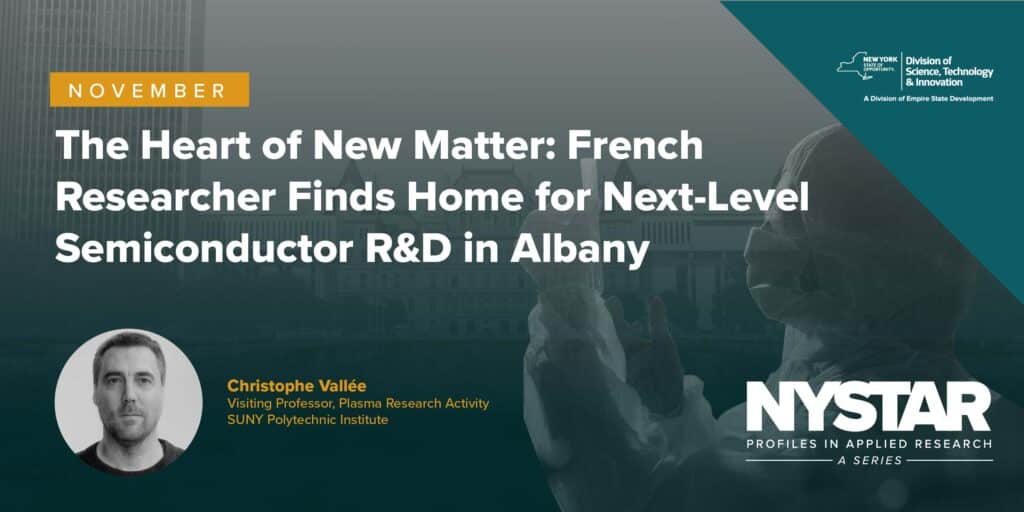The Heart of New Matter: French Researcher Finds Home for Next-Level Semiconductor R&D in Albany
In communities across New York State, some of the world’s brightest minds are pursuing groundbreaking and life-saving discoveries in partnership with research and innovation centers backed by NYSTAR, Empire State Development’s Division of Science, Technology, and Innovation. NYSTAR’s Profiles in Research series will share the stories of incredible researchers who are creating positive change and fueling technology-led economic growth statewide.
In his home country of France, Christophe Vallée went looking for a research activity for his doctorate program in physics and found himself facing a common decision – did he want to structure his research for a career in the academic world or for business?
That’s when he learned about cold plasma, an emerging technology with vast potential in the semiconductor space. He became enchanted with the prospects of straddling both the university and industry worlds.
“I looked at doing some plasma research activity in France and thought it could be fun,” Vallée said. “It’s experimental research and I like to play with my hands as I try to play with my brain. So, I say it’s perfect for me.
“What I liked about this research activity is that it’s related to the industry. So sometimes I can do very fundamental research with no application in mind. It’s just to understand something basic about the plasma. But sometimes I may have a project really connected with the industry and very important for industrial people. So we can learn together.”
The learning together continues in Albany, N.Y., as Vallée was named the first Tokyo Electron Limited (TEL) Innovation Scientist at SUNY Polytechnic Institute, located at the most advanced publicly owned semiconductor research-and-development facility of its kind in the country. With additional support from the school’s Center for Advanced Technology in Nanomaterials and Nanoelectronics (CATN2), backed by NYSTAR, Empire State Development’s Division of Science, Technology, and Innovation, Vallée has been able to build out his research group, creating more opportunities for fundamental research and practical applications for industry partners.
“SUNY Poly is an ideal place for what I want to do. You have staff and faculty so you can do research activity, and at the same time you have industry using [your] research in real life for semiconductor devices,” Vallée said. “You have a direct connection between what you can do in research and what is used in industry.”
Vallée is also excited about giving meaningful experiences to the next generation of scientists and industry leaders — opportunities enhanced by the state-of-the-art facilities at SUNY Poly and CATN2.
“You can teach cold plasma everywhere in the U.S.,” he said. “I can give the same lecture anywhere. But everyone in the U.S. will not be able afterward to go to a clean room and use the 300-millimeter plasma process. That is the main difference. Here you can give training to students and then they can practice on real industry tools. So here it’s very different because you have a direct connection between fundamental research and industry.”
Vallée’s research looks at ways to use plasma deposition and etching to process semiconducting materials for use in the fabrication of electronics. To improve function and efficiency, the process of creating microchips has become more specialized and involved.
Think about the evolution of cars. Gone are the days when you could take apart your car and fix it yourself. Aside from minor repairs, cars have become too advanced with computer circuitry. You need trained experts to work on your car. The same can be said for computers. Gone are the days of building a computer in your basement. The technology has gotten smaller and more complex.
And therefore, researchers and manufacturers need more specialized, and expensive, tools.
That’s where CATN2 and NYSTAR have stepped in, purchasing a 200-millimeter wafer tool for Vallée’s lab at SUNY-Poly. While Vallée and his graduate students have been able to use the 300-millimeter plasma tool at Tokyo Electron Limited for industry-level applications, their fundamental research using different conditions and materials calls for its own tool.
“The [NYSTAR-backed center] has invested in the purchase of a 200-millimeter wafer tool, which allows for more freedom to try things that may not be authorized within the 300-millimeter line because you have to be very careful not to jeopardize other projects or processes being run on those industry tools,” said Michael Fancher, director of CATN2. “What Christophe is studying is a potential technology driver for the next generation of computer chips. It’s an enabling area of science that will have a broad impact not just on advanced computer chips but potentially on power electronics, sensors, and a variety of non-scale processes.”
The program and partnerships that brought Vallée to Albany — bringing together an industry partner, the university, and NSYTAR-funded centers — is something that Fancher and SUNY Poly are trying to replicate, making New York’s Capital Region an attractive destination for scientists to build out their research teams.
“We’re constantly trying to attract more companies to come to the region and there are companies interested in working with Christophe,” Fancher said. “Companies that build these tools have expressed interest in locating their tools in Albany because he’s here, but also because of all the other things that are going on at SUNY Poly and CATN2.”

